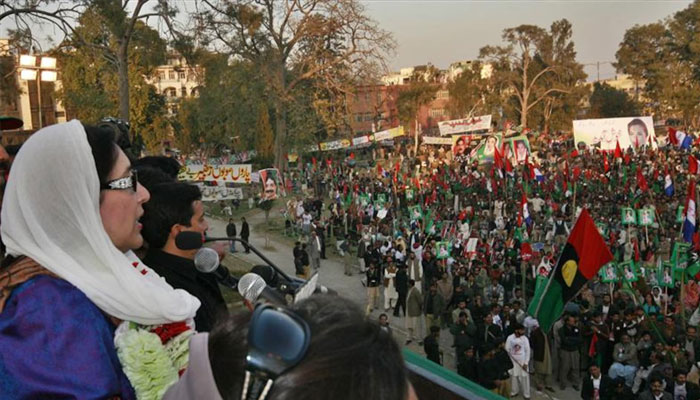Benazir Bhutto: The torchbearer of courage and democracy
Benazir Bhutto's life stands as a symbol of resilience, courage, and unwavering dedication to democracy. From her formative years to her tragic assassination, her journey is a testament to her indomitable spirit and her relentless pursuit of justice and progress for Pakistan.
At the age of 16, Benazir began her remarkable journey, leaving the comforts of home to pursue higher education at Harvard University and later at Oxford. These experiences not only broadened her horizons but also prepared her for a life of public service. However, her return to Pakistan marked the beginning of profound trials.
The overthrow of her father, Zulfikar Ali Bhutto, by General Zia-ul-Haq plunged her into a relentless battle against dictatorship. Despite her father’s warning to leave the country, Benazir chose to stay and fight for democracy alongside her mother, Nusrat Bhutto. This decision subjected her to years of imprisonment, torture, and house arrest.
The loss of her father, executed after a controversial trial, was a defining moment in her life. In her autobiography, Daughter of Destiny, Benazir poignantly recalls the night of his execution, a night filled with anguish and despair. Despite the immense personal loss, she emerged stronger, driven by the vision of a democratic Pakistan.
Her resilience was further tested during her imprisonment in Sukkur Jail, where she endured inhumane conditions that took a toll on her health. Even exile brought little respite, as she faced the devastating loss of her youngest brother, Shahnawaz. Yet, these adversities only deepened her resolve.
Benazir’s return to Pakistan in 1986 was met with an unprecedented outpouring of support, symbolizing her deep connection with the people. Her leadership brought the Pakistan Peoples Party (PPP) to victory in the 1988 elections, making her the first female Prime Minister of a Muslim-majority country.
Her time in office was fraught with challenges—political conspiracies, personal tragedies, and relentless opposition. The assassination of her brother, Murtaza Bhutto, in 1996 and the incarceration of her husband, Asif Ali Zardari, added to her burdens. Despite these setbacks, she continued to fight for democracy while raising her children amidst political turmoil.
Benazir’s decision to return to Pakistan in 2007, knowing the risks to her life, was an act of unparalleled bravery. Greeted by a massive public reception, her return symbolized hope for the people and her unbreakable bond with her nation. Tragically, her life was cut short in a terrorist attack, but her legacy endures as a beacon of courage and democracy.
Benazir Bhutto’s story is one of extraordinary strength in the face of unimaginable challenges. She endured the loss of her father and brothers, imprisonment, exile, and personal sacrifices, yet remained steadfast in her commitment to her people and her nation. Her life serves as an enduring inspiration, reminding us that true leadership lies in selfless service and unwavering dedication to the greater good.
Her legacy will forever illuminate the path for those who dare to dream of a better, more just world. #SalamBenazir
-
 Savannah Guthrie Sends Desperate Plea To Mom Nancy Kidnapper
Savannah Guthrie Sends Desperate Plea To Mom Nancy Kidnapper -
 NBA All-Star 2026 Shake-up: Inside The New USA Vs World Tournament Format
NBA All-Star 2026 Shake-up: Inside The New USA Vs World Tournament Format -
 Warner Bros Consider Reopening Deal Talks With Paramount, Says Reports
Warner Bros Consider Reopening Deal Talks With Paramount, Says Reports -
 Andrew Mountbatten Windsor Faces Future With UK MPs, Says Expert
Andrew Mountbatten Windsor Faces Future With UK MPs, Says Expert -
 Shamed Andrew Told 'nobody Is Above The Law' Amid Harrowing Silence
Shamed Andrew Told 'nobody Is Above The Law' Amid Harrowing Silence -
 Gisele Bundchen Melts Hearts With Sweet Bike Ride Glimpse Featuring Son
Gisele Bundchen Melts Hearts With Sweet Bike Ride Glimpse Featuring Son -
 Prince William Found Meghan Markle ‘quite Refreshing’ At Start
Prince William Found Meghan Markle ‘quite Refreshing’ At Start -
 Kate Middleton Knew Should Could Not Be ‘voice Of Reason’ With Prince Harry
Kate Middleton Knew Should Could Not Be ‘voice Of Reason’ With Prince Harry -
 Rihanna Has Wardrobe Malfunction At A$AP Rocky Fashion Show
Rihanna Has Wardrobe Malfunction At A$AP Rocky Fashion Show -
 Prince Harry Felt System Had ‘one Rule For Him, One For Prince William’
Prince Harry Felt System Had ‘one Rule For Him, One For Prince William’ -
 Jake Paul's Fiancée Sends Him Over The Moon Over Stunning Victory
Jake Paul's Fiancée Sends Him Over The Moon Over Stunning Victory -
 Harper Beckham Sends Valentine’s Love Amid Brooklyn Family Drama
Harper Beckham Sends Valentine’s Love Amid Brooklyn Family Drama -
 Why Prince William, Kate Middleton 'partnership' Is Important For Monarchy
Why Prince William, Kate Middleton 'partnership' Is Important For Monarchy -
 Katie Price Drama Escalates As Family Stays In Touch With Ex JJ Slater
Katie Price Drama Escalates As Family Stays In Touch With Ex JJ Slater -
 Critics Target Palace Narrative After Andrew's Controversy Refuses To Die
Critics Target Palace Narrative After Andrew's Controversy Refuses To Die -
 Sarah Ferguson’s Delusions Take A Turn For The Worse: ‘She’s Been Deserted’
Sarah Ferguson’s Delusions Take A Turn For The Worse: ‘She’s Been Deserted’




